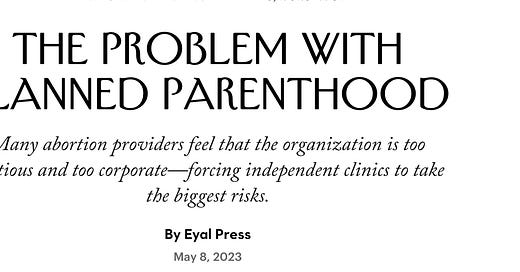New Yorker writer looks at Planned Parenthood
Eyal Press wrote eye-opening piece about disagreements among movement leadership
The New Yorker recently published a fantastic piece that looked at how local activists perceived Planned Parenthood and the national direction of the movement. I spoke with the writer Eyal Press over the phone to learn more about his reporting and other details I wanted to go into greater depth about.
The article, “The Problem with Planned Parenthood,” appeared in the May 8 edition of the publication. It features interviews with the current and past presidents of the organization. It shows abortion providers who expressed frustration that the organization hadn’t done more to help them and the women they serve. Those activists and healthcare professionals wanted a more uncompromising approach from PPFA.
Press said the piece more likely shocked donors than it did people in the movement. Some in the movement don’t think journalists or leaders should publish disagreements because it emboldens the opposition. Press feels differently.
“The flip side of that is that movements that don't air tactical disagreements, strategic disagreements, disagreements over principle and over how resources are allocated tend not to change and adapt,” Press said.
Many of the activists he spoke to felt the movement had too centralized leadership.
“It does bring I think different issues to light that haven't gotten as much attention, including the question of how resources should be deployed to broaden access in challenging states and challenging parts of the country, which is of course a crucial question now that the abortion issues back in the hands of states.”
Planned Parenthood recently announced that it would cut 10 percent of its national staff and reallocate the money to local affiliates. PPFA President Alexis McGill Johnson said it had more to do with changing priorities than budgeting issues.
I also spoke with Press about what the organization’s previous leaders thought about the recent decision to have the organization distance itself from Margaret Sanger. I’ve defended her in this newsletter before, and I plan on publishing more critical views of Sanger going forward, including from an interview I did this week with Dorothy Roberts, author of Killing the Black Body: Race, Reproduction, and the Meaning of Liberty. Roberts has written about the intersection of racism, eugenics and the early birth control movement.
Press said that there is a lot of disagreement over her.
“Sanger is a controversial figure,” Press said. “I think there are past leaders of Planned Parenthood who feel for whatever flaws she might have had–she certainly made common cause with the eugenics movement at certain points, and with whatever statements she might have made that read terribly today–that repudiating everything she stood for is going too far.”




